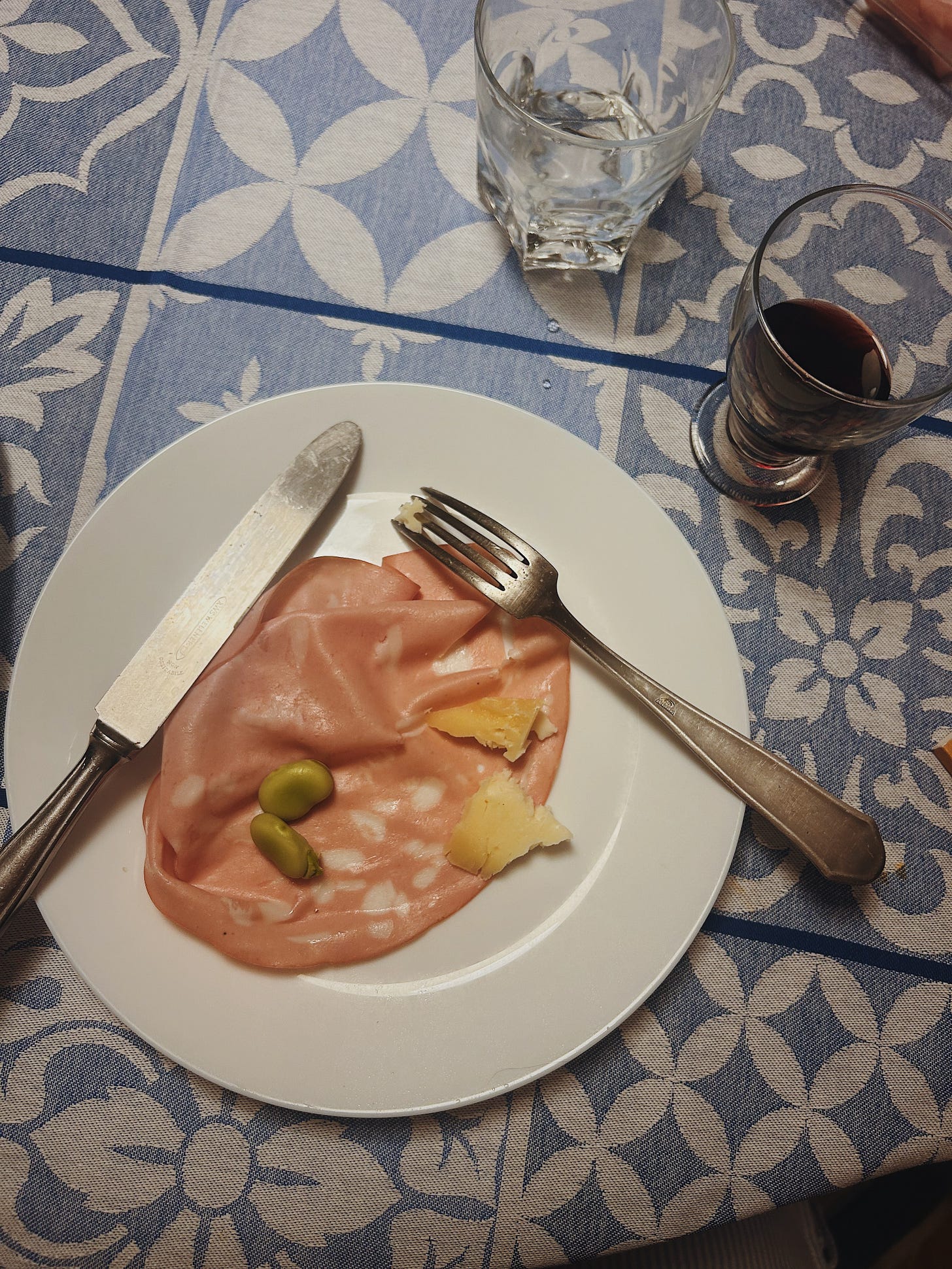The Belly of Florence
Some Florentines don’t even like lampredotto- so why was I trying so hard to love cow stomach?
“I wish I loved lampredotto as much as Stanley Tucci.” We were watching Tucci’s new show, when I looked over at you and said, “I’ve been there!”
At the start of May, I went to Firenze for a week to stay with a host family (that only spoke Italian), and to go to cooking & language school. Immersion, baby.
I hadn’t tried lampredotto yet, and it was my last night in the city—I had better get a wriggle on.
I had talked it up in my head: lampredotto is the fourth stomach of the cow. Yeah, sounds good, I thought! This dish was developed by the working class of Florence - it’s further down the digestive tract - a cut of meat that was less desirable and therefore cheap and accessible to the masses.
You might think I’m crazy, but as a food scientist, I want to taste each place I’m lucky enough to visit. Trying the local delicacy is always high on my list.
I wandered through the cobblestone streets, eventually finding the truck. It was a spring afternoon, 28°C and sunny. The line was long and sweaty. The air was thick with the aroma of cooking meat, tomatoes, and potatoes—ready for the lunchtime rush.
My Italian comprehension is okay, but the vino had gone to my head. I couldn’t understand what one of the chefs was shouting to the crowd. To finish, he yelled, “Translation… no translation!”
I respect that. I like that.
Still, I got my translation elsewhere. I had two options: queue in the heat for the OG stomach roll, or cut the line for today’s special—tomato and potato.
Cow stomach is cow stomach to me, so I jumped forward and ordered in my best Italian: “Vorrei lo speciale e il vino rosso, per favore.”
Of course, my strong Australian accent enticed the boys of the belly (I don’t know if they want to be called that) to ask, “Di dove sei?”
“I’m from Australia—with Sicilian heritage,” I said.
Their friendly Florentine nature poured out of the truck, just like the wine they were handing out in tiny plastic cups. In a mix of English and Italian, the vibes were high. I had my takeaway, my flimsy wine cup, and some stickers to take back to Australia. As a small business owner, I love a lil guerrilla marketing. I cherish these stickers—one for the junk journal, one for the Leichhardt bus stop.
The experience was 10/10. I was giddy, ready for the offal that would change my mind about offal.
I left—spilling red wine straight onto my T-shirt. Eye roll Why am I like this?
I stopped by Antica Pasticceria Sieni, a 110+ year old bakery hidden behind the leather market stalls. The counter was full of beautiful desserts! I bought three cakes. I can’t remember what they were called, but one tasted like Christmas pudding (according to my host father), one was hazelnut (our favorite), and one was coconut that reminded me of lamingtons.
I headed back to my host family—lampredotto and dolci in hand—to enjoy our final meal together. I arrived late… ahh, did I get too used to Italian time?
To my surprise, my house mother had made pappa al pomodoro, a classic Florentine tomato and bread soup. She also gifted me two cookbooks on Florentine cuisine.
Sharing food and recipes can transcend language barriers—it creates a space for connection, understanding, and seeing the world through someone else’s eyes, right at the kitchen table. Offering a recipe is a sacred, deeply personal act. To invite someone into your kitchen is, in many ways, to invite them into your soul.
They heated up the lampredotto, and my host father and mother watched me eat—or rather, watched me consider eating.
It really did look and smell a little like dog food. I’m sorry for the not-very-photogenic photo.
My host father filled my glass with wine. I think he thought I needed liquid courage.
My first bite: “Ohh… it’s very strong. Very chewy. Oh—it’s very final stomach (pre-colon, if you will) in taste.”
Swallowing was much harder than expected.
They asked what I thought, but I had to ask first: “Do you eat this? Do you like this?”
They laughed and said no. You either like it or you hate it, and there’s no in-between.
I asked if it would be rude not to finish it. Oh thank goodness—it’s not? Okay. One more bite, just to be sure.
It was not good. And I was devastated by that.
But my host family promptly asked if they could take it away. I had tried it—that was good enough for us all.
“Vuoi altro vino?” And to wash it down, my host father pushed his plate of local pecorino, fava, and mortadella my way. “Mangi, mangi.”
When there’s a lardo, robiola & honey panino, or zucchini & truffle pizza, or spinach & ricotta cannelloni, like I made at cooking school (more to come on that). It’s okay to not enjoy every local delicacy—even some locals aren’t rushing out to get offal sandwiches.







